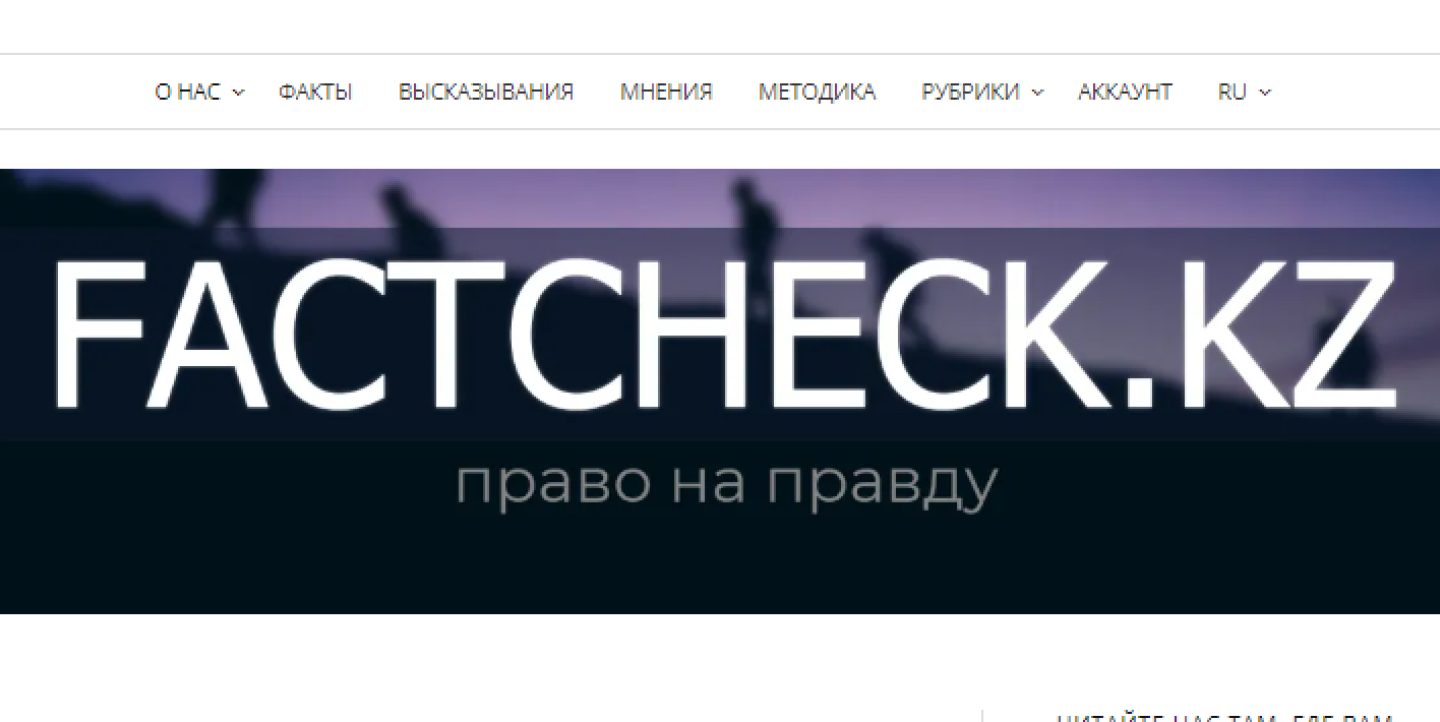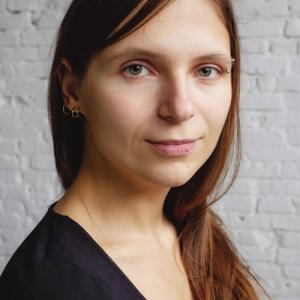Russia’s invasion of Ukraine. Protests in Kazakhstan. Revolution in Belarus. Events of this scale lead to more polarized societies.
Journalists behind the Kazakh project Factcheck.kz believe enhanced efforts to verify information can overcome the polarization.
Low media literacy rates in Kazakhstan
Factcheck.kz is Central Asia’s first fact-checking initiative. Its story began in 2014, in the aftermath of the Euromaidan revolution in Ukraine. Kazakh journalist and editor Adil Jalilov traveled to the country to see what was happening for himself. When he returned to Kazakhstan, he was shocked by how differently people interpreted the events.
"I saw everyone fighting over it. Maidan is far away but we are Russia’s backyard, in a sense. We are very susceptible to Russian propaganda, especially outside the big cities,” said Jalilov.
Understanding that low media literacy rates are an issue in Kazakhstan, Jalilov sought out a “journalism lighthouse” — to publish facts. He looked into fact-checking and realized it was precisely what he needed.
"As an old-school journalist, I find classic journalism boring now. I like fact-checking much better,” said Jalilov. “Everyone needs basic fact-checking skills. It's like [knowing how to] brush your teeth.”
Jalilov has been working in media since the mid-1990s. He served as head of the online publication “Vlast” and the human rights platform “Voice of Central Asia.” Today, he is the head of the international journalism center MediaNet, and the founder and director of Factcheck.kz.
To launch Factcheck.kz, Jalilov networked with other newsrooms and well-known fact-checking organizations around the world. He then assembled and trained an editorial team.
"The best experts in this field in the former Soviet Union [work] in Ukraine and Georgia. We chose a Ukrainian newsroom: Stopfake organized a series of meetings with leading fact-checkers for us," said Jalilov.
Working without a “protector”
Funding for Factcheck.kz wasn’t easy to find, but with help from the Soros Foundation the project launched in March 2017.
"The first thing my team did was ask where we set our boundaries: who is untouchable [in our reporting]. Any post-Soviet journalist would get this. I replied, 'Let's try not to be afraid of anyone," explained Jalilov. They said: ‘Is it possible? Do we have any [organization to protect us from outside pressures]?’ I said, ‘No, but we will join an international fact-checking network.’”
The International Fact-Checking Network (IFCN) is composed of some of the best fact-checking organizations in the world, Jalilov noted. Factcheck.kz is one of them, despite the danger that follows the work in Kazakhstan. Editors receive letters and calls with threats. During the pandemic anti-vaxxers repeatedly threatened to burn the newsroom down.
"I tell everyone: we are part of a network that includes organizations all over the world, and all of them will stand up for us, including The Washington Post," said Jalilov.
Growing the audience
In its first year, Factcheck.kz held more than a dozen workshops in cities across Kazakhstan, drawing full houses. The outlet trained editorial boards in other Central Asian countries, too, including Kyrgyzstan, Tajikistan and Uzbekistan.
Today the project conducts opinion polls, runs fact-checking courses and organizes training sessions with experts. The editorial team produces media literacy textbooks for young students, and teacher manuals. The website features articles outlining its fact-checking methodology.
"Sometimes I receive a screenshot from a neighborhood chat where people refer to our publications when they’re in a dispute,” said Jalilov. “The lower and upper houses of parliament are also active readers. We recently found out that MPs congratulate each other if Factcheck.kz confirms that an MP did not make a mistake in his speech.”
The outlet’s traffic peaked during the pandemic, receiving up to 200,000 visits a day. Today it gets 1.5-2 million unique visitors per month, alongside almost 30,000 followers on Instagram and over 13,000 on Telegram. The publication plans to network with smaller partner media outlets in Kazakhstan to further grow its readership.
Factcheck.kz is fully funded by non-state donors. "I don't want to become dependent — I have no illusions about our authoritarian president and government, under which the notion of freedom of speech has completely lost its value,” said Jalilov. “For them, media is a propaganda tool."
Approaches for verifying information
Journalists need to be especially diligent when working in polarized societies. Accurate, effective fact-checking is especially critical in these settings.
Take Russia’s invasion of Ukraine, for example. "We conducted a survey through the public opinion monitoring bureau Demoscope and were shocked: about 70% of Kazakhs approve of the war. We realized that Russian propaganda has [affected people's view of the world to a catastrophic degree]," said Jalilov.
To boost their fact-checking, journalists can better utilize search engines to verify text, photos, videos and links. "Even journalists use search engines at just half a percent of their power. You have to know how to tweak these systems and use them beyond the advanced search. Don’t just use Google; in some cases, Yandex and other systems are a big help," said Jalilov.
Journalists can also take advantage of new tools to detect deepfakes and otherwise doctored videos, in addition to services that measure audience reach and engagement. One example is the content analysis tool Popsters.
"Imagine some news is out. You find the account that first published the story using a search engine. You check the reach and engagement of the account and make a list of possible subscribers who spread this information. You can see whether it was done artificially by checking the time of publication; for example, it could be fake if several sources pushed it out at nine in the morning," explained Jalilov.
These are very basic tools, he added, that when applied together can be very effective. “It's important to not just search by picture or video, but verify the time of their publication. It’s important to be able to analyze multimedia files’ metadata. It’s important to tell whether a photo editor has been used, and understand the logic behind it, what exactly they were trying to change.”
Finally, utilize simple ways to verify information when possible. "Once, I was asked about an unknown object installed on the roof of a nearby building. I took a picture of the object and ran a Google Image search. It was a basic 5G station," Jalilov explained.
“We brought fact-checking back in vogue”
As for the events that took place in Kazakhstan in January 2022, Jalilov is convinced that they led to big changes in the country. It started off with protests, then street violence that led to police violence.
"The January events — gruesome, bloody, incomprehensible — changed a lot of things in the country. Many people were shot; children were killed while traveling by car. There was this one girl that had seven bullet wounds,” said Jalilov.
But something more fundamental has changed, too. People no longer want to live like they used to. They demand more freedom. This is a challenge for fact-checkers: readers reach out more often with requests to verify information on more controversial topics,” Jalilov noted. “We see it as our mission to ensure that logic trumps emotion and that people think straight.”
When launching Factchek.kz, Jalilov shared his mission to bring together Russian and Kazakh speakers. "I hope we’ve become a lighthouse, a reference point for many media outlets. If we label something as truth or as manipulation, people trust us,” said Jalilov. “We opened a window to the civilized world of fact-checking — we set the standards and brought fact-checking back in vogue.”
Photo: screenshot from Factcheck.kz homepage.
This article was originally published on our Russian site. It was translated to English by our IJNet Russian translator, Alexandra Tyan.


